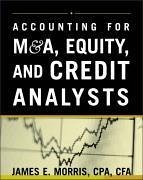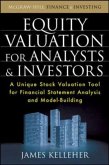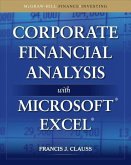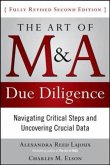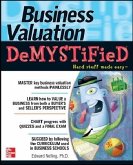As each new accounting question or scandal hits Wall Street, investment professionals too often find themselves asking, "What happened?" "Accounting for M&A, Equity, and CreditAnalysts" answers the most common accounting questions, all inan easy-to-follow format designed to provide investment professionalswith real-world, hands-on knowledge of key accountingtreatments, models, and practices. Written by well-knownM&A expert James E. Morris, this versatile accounting deskreference bridges the gap between what is taught in businessschool and what is needed in the real world.
Everything investment professionals need to know about accounting--in a practical desk reference format In today's world of constantly changing accounting rules, models, and practices, investment professionals need an authoritative, all-in-one, fast-access reference for the latest knowledge and information. Accounting for M&A, Equity, and Credit Analysts provides comprehensive and easy-to-understand answers to the everyday accounting questions that come up time and again in the investing arena. Noted M&A accounting authority James E. Morris has spent years dispensing accounting advice on Wall Street, and he knows which questions consistently baffle even the most experienced investment pros. He answers those questions and hundreds more as he provides clear and concise explanations of areas including: Subtle, less understood aspects of common accounting areas and procedures Purchase accounting for business combinations--essential not only for M&A analysts but for credit and equity analysts as well Accounting for employee stock options, and its effect on both earnings and cash flow Today's investment accounting landscape is undergoing tumultuous and unprecedented change. Professionals who fail to keep up with that change risk being left behind. Accounting for M&A, Equity, and Credit Analysts updates you on virtually every important facet of investment accounting, and provides the handy reference you need to instantly know what the numbers are really saying to you--and, just as important, what they are not. "This is not, by any means, another financial accounting textbook. Instead, I intend it as a sort of spotlight, illuminating what I have found in my investment experience to be the 'black holes' of accounting. It is merely the collected answers to the questions that analysts (associates, vice presidents, managing directors and clients as well) have asked me during the time I spent giving accounting advice on Wall Street." --From the Preface Investment professionals too often regard the acquisition of accounting knowledge as a necessary evil--and, therefore, too often know less than they should. This lack of knowledge often leads to simple misunderstandings or even out and out errors that, at best, serve as minor speed bumps in a high-stakes transaction and, at worst, lead to the delay or even derailing of the deals in question. Accounting for M&A, Equity, and Credit Analysts helps investment professionals as well as undergraduate and graduate students of and investment banking ensure that they will always be able to quickly and confidently get their hands on the right answers to virtually every accounting question. Providing easy-access accounting information without needless detail and CPA doublespeak, this invaluable reference distinguishes itself from other texts of its type in four major areas as it: Bypasses common-knowledge accounting basics to concentrate only on information vital to investment analysts Takes an investment banking perspective as opposed to one solely focused on Generally Accepted Accounting Principles (GAAP) and reporting Integrates financial modeling and spreadsheet approaches that are essential to forecasting and analysis Provides in-depth coverage of items in enterprise valuation and business combination transactions In the investment profession, few factors are as valuable or overlooked as solid knowledge in accounting. Unfortunately, when professionals seek to increase their accounting expertise, they are too often faced with either cartoonish workbooks or incomprehensible, 600-page textbooks...
Hinweis: Dieser Artikel kann nur an eine deutsche Lieferadresse ausgeliefert werden.
Everything investment professionals need to know about accounting--in a practical desk reference format In today's world of constantly changing accounting rules, models, and practices, investment professionals need an authoritative, all-in-one, fast-access reference for the latest knowledge and information. Accounting for M&A, Equity, and Credit Analysts provides comprehensive and easy-to-understand answers to the everyday accounting questions that come up time and again in the investing arena. Noted M&A accounting authority James E. Morris has spent years dispensing accounting advice on Wall Street, and he knows which questions consistently baffle even the most experienced investment pros. He answers those questions and hundreds more as he provides clear and concise explanations of areas including: Subtle, less understood aspects of common accounting areas and procedures Purchase accounting for business combinations--essential not only for M&A analysts but for credit and equity analysts as well Accounting for employee stock options, and its effect on both earnings and cash flow Today's investment accounting landscape is undergoing tumultuous and unprecedented change. Professionals who fail to keep up with that change risk being left behind. Accounting for M&A, Equity, and Credit Analysts updates you on virtually every important facet of investment accounting, and provides the handy reference you need to instantly know what the numbers are really saying to you--and, just as important, what they are not. "This is not, by any means, another financial accounting textbook. Instead, I intend it as a sort of spotlight, illuminating what I have found in my investment experience to be the 'black holes' of accounting. It is merely the collected answers to the questions that analysts (associates, vice presidents, managing directors and clients as well) have asked me during the time I spent giving accounting advice on Wall Street." --From the Preface Investment professionals too often regard the acquisition of accounting knowledge as a necessary evil--and, therefore, too often know less than they should. This lack of knowledge often leads to simple misunderstandings or even out and out errors that, at best, serve as minor speed bumps in a high-stakes transaction and, at worst, lead to the delay or even derailing of the deals in question. Accounting for M&A, Equity, and Credit Analysts helps investment professionals as well as undergraduate and graduate students of and investment banking ensure that they will always be able to quickly and confidently get their hands on the right answers to virtually every accounting question. Providing easy-access accounting information without needless detail and CPA doublespeak, this invaluable reference distinguishes itself from other texts of its type in four major areas as it: Bypasses common-knowledge accounting basics to concentrate only on information vital to investment analysts Takes an investment banking perspective as opposed to one solely focused on Generally Accepted Accounting Principles (GAAP) and reporting Integrates financial modeling and spreadsheet approaches that are essential to forecasting and analysis Provides in-depth coverage of items in enterprise valuation and business combination transactions In the investment profession, few factors are as valuable or overlooked as solid knowledge in accounting. Unfortunately, when professionals seek to increase their accounting expertise, they are too often faced with either cartoonish workbooks or incomprehensible, 600-page textbooks...
Hinweis: Dieser Artikel kann nur an eine deutsche Lieferadresse ausgeliefert werden.

